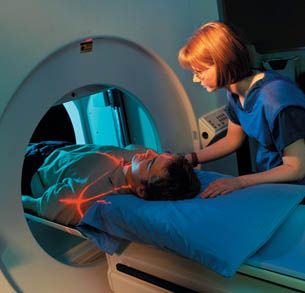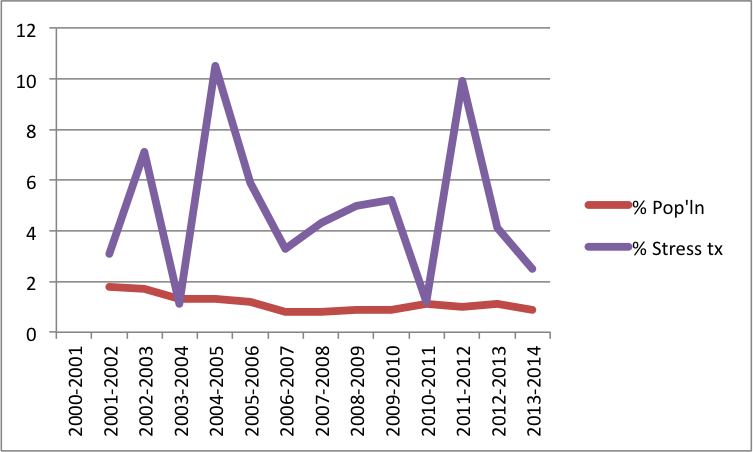 “I just have to order more tests,” a senior physician said.
“I just have to order more tests,” a senior physician said.
“No one will support you if you don’t order a CT on someone no matter how trivial the pain. If they find an aortic dissection later, and see that you documented any pain at all…you’re in trouble!”
Fifteen years ago, CT scans were slow, expensive and required special permission from a radiologist. Today, head scans take less than a minute, require no special permission and are still expensive.
As technology improves, we use more of it. Faster, accurate scans, with less radiation, play a bigger role in routine clinical care every year. But beyond technology, do doctors just order more tests?
Medical Test Epidemic
To get around the impact of new technology, we could look at a test that’s been around for decades. Dr. Robert A Bruce first published on exercise stress testing in 1949. The modern Bruce Protocol came out in 1963. It’s still a cornerstone in cardiac workup. Most Doctors order dozens of them.
Treadmill technology and computerized readouts improved stress testing but have not changed the basic nature of the test. Just like plain X-Rays still produce images even with computerization, cardiac stress testing gives essentially the same results as 30 or 40 years ago.
Stress Test Volumes (x10) vs. Population (‘000). Ontario 2000-2014
 Stress Test vs. Population, % Change
Stress Test vs. Population, % Change
While population increased 15.9% from 2000 to 2014, stress tests increased 84.6%.
Expectations
System planners would love to find one cause for the medical test epidemic. They cannot. The explosion of medical tests could stem from one or a combination of:
- Patient requests
- Aging Population
- Physician habit/peer pressure
- Consultants’ referral requirements
- Fear of regulation
- Fear of litigation
- Guidelines
- Expert opinion
- New technology
- Advertising
- Trends in other countries
- Fashion
Expectations change and usually grow. Doctors can no longer get away without a knee MRI before saying, “There’s nothing surgical.” Telling someone their knees look worn out on plain film X-Rays will not satisfy a sophisticated patient.
- Consultants expect certain tests before they see a referral.
- Colleagues expect peers to include specific tests in ‘routine’ workups.
- Regulation drives doctors to think less and follow guidelines more.
“Standard of care” is a collage of patient expectations, peer pressure, medico-legal threats, time pressures, expert opinion and one thousand other things.
Two Options
As much as we hate it, water always runs downhill, and supply always links with demand. Free medical testing creates unlimited demand. Politicians can either:
- Ration. Limit test availability. Long wait-lists ration care, but politicians hate the risk. Expect more class action law suits like the one in BC as patients suffer avoidable harm from rationing.
Or
- Introduce Costs. For example, patients could direct funds from their government sponsored health savings accounts, or they could spend their own money on tests.
Escalating expectations for a free service guarantees exponential growth in demand for that service and further growth in expectations. It’s vicious.
For now, the Ontario government decided to fund growth by slashing doctors’ fees. After docs wake up to the 20-30% cut to their net incomes, and patients realize what’s happened to access, Medicare will be in tatters.
What do you think? Is the medical test epidemic a portent for Medicare, evidence of medical progress, or both?
Data source: OMA Economics, Research & Analytics; Photo credit: fda.gov
Video Bonus:
Dr. Donohue shared this brilliant 5 minute video “Bridge Over Diagnosis – A parody of Bridge Over Troubled Water”. Enjoy.


As doctors became concerned/coerced for whatever reason…test were order and we pts where happy that we were being physically assessed by not only doc but very sophisticated medical technology. I think it can make some of us fearful that something is being missed if tests are to be rationed. Yet, some surly will be. My cardiologist says he can stop seeing me until I probably have another event as I’m good for now. My response…I’m getting older not younger & appreciate I have a specialist to hopefully delay that inevitable next event. So, I want the CRP test that screens for inflamation, I want to track cholesterol, triglycerides etc. Until the govt tells me I can’t have these & I can pay for them….bring them on. Docs are using tests to ensure their diagnosis is accurate and has become part of their examination. Radiologist friend in Calgary told me when on call, every patient that comes to ER is sent for scan…..he says most are not needed. I ask you, do you want to miss something that scan might show? Cost are clearly more than provinces can afford or are willing to afford. If we want the full assessment by doc, we must tell govt that and expect more taxes. We could also benefit by having choices that a form of hybrid wld provide. Now our choices are what big bother decides is good for us. That will only result in suffering, pain and possibly death.
Until that day…..which way to the lab.
Great comment, Don!
Be sure of this, that same radiologist who told you “…most [CT scans] are not needed” would be the first one to throw a torch to burn the ED doc for a ‘missed diagnosis’. Arrogant chest thumping about over-testing comes from corpulent experts in armchairs.
As a former Chief and Medical Director of one of the largest EDs in Ontario, I’ve had to review many cases with bad outcomes. No one EVER gets a pass for not ordering a test. Even if every test under the sun got ordered, some hind-sight expert will come up from an ivory tower and pontificate about how the hoi polloi in the hinterlands need to brush up on their clinical skills and order more tests.
I’m sorry for being less gracious than usual on this one. It drives me nuts how easily some docs criticize others for ‘ordering too many tests’ but never have the guts to put their name on the chart for refusing one.
Thanks again for a great comment and for raising my blood pressure! 🙂
Warm regards,
Shawn
I agree….medicine is changing with new techniques and tests. Pts are much better informed than yrs ago. The consultation of pt & doc has a two sided dynamic which wasn’t always the case. As you describe arrogance benefits no one. I believe clinical skills have made significant improvements because of TESTING.
Love your thought provoking articles.
Thanx Shawn
D
Thanks again, Don. I agree completely. Outcomes improve when patients have great information and are empowered to use it. Every other industry works hard to educate and empower patients. Healthcare should be leading the way. Of course, tests need perspective; that’s where a great relationship with your physicians(s) comes in.
Appreciate you reading and commenting!
Best
Shawn
Cost/benefit ratio is often mentioned but not very often is the risk/benefit ratio. Investigations today are not as invasive and dangerous as they used to be. We no longer do air encephalograms and carotid arteriograms with directly injected dyes like we used to do when I was doing neurology in medical school in the 70s. These were painful and/or dangerous. There are now many excellent diagnostic tests with the only downside being cost.
Who decides whether the cost is worthwhile? That is the big question now because there is little physical downside to doing the test.
Great comment, Gerry!
If accuracy and outcomes improve in the face of reduced risk, why shouldn’t we order tonnes more tests? If a safe test offers a chance of improved outcomes, who are we to deny it?
But we don’t deny it….we take the passive aggressive approach and delay it as long as possible…
Thanks again for reading and commenting!
Best regards,
Shawn
Shawn Great Topic! I use to think a history and physical were the mainstay of diagnosis and treatment..I now realise that this is not the standard of care . If there is a missed diagnosis or even if there is not the first question will be why did you not order an X-ray,ultrasound,CT scan or MRI? No point in even doing a physical let alone a thorough history!! Tim Nicholas
You nailed it, Tim. We live in a new reality where tests mean far more than history and physical. They’re the objective criteria against which you’re judged.
Thanks for giving me the idea for the post!
Best regards,
Shawn